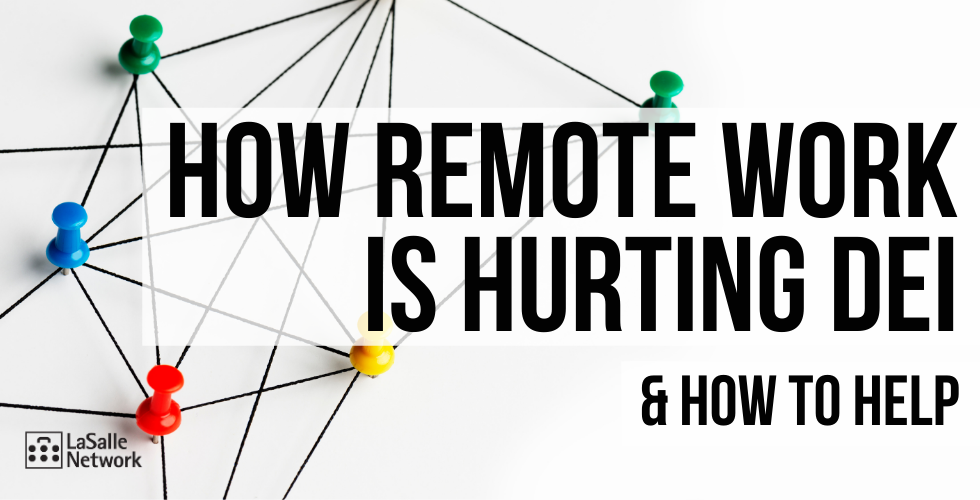While 2020 brought many changes to the typical workforce, two major trends that emerged in the last year are likely to continue to be a major focus for many businesses into the foreseeable future: the normalization of remote or blended workforces and a reinvigorated focus on diversity, equity and inclusion (DEI) initiatives.
Working from home has become the norm for many businesses across the U.S. after a year of trial-by-fire with entire workforces transitioning to remote work with little warning. Remote work is predicted to continue as a popular option for many businesses in the future and it is estimated that 70% of the workforce will be working remotely at least five days a month by 2025.
A renewed attention has been focused on DEI initiatives in the last year following a series of nationwide protests regarding racial inequality, with many prominent employers hiring new chief diversity officers or other DEI-related professionals to help lead these initiatives in the years to come.
Working remotely can make the job itself more accessible to some but can also feel isolating and impair workers from feeling truly connected to their team and the mission of the organization. At the same time as organizations are working to reinvigorate their DEI initiatives, their workforces may be feeling less connected and included than ever before. The combination of a remote workforce with a renewed focus on DEI means companies will have to strategize ways to not only hire and retain diverse talent but also ensure equal opportunities are afforded to all workers, and the inclusion of all employees remotely.
Below, we share two key considerations for teams to help support DEI initiatives virtually.
Ingrain DEI Initiatives into Company Culture
While many organizations have metrics and goals around hiring diverse talent, retaining diverse talent is just as important, which requires a supportive and inclusive culture. 94% of future-of-work strategy leaders say a strong company culture is crucial in ensuring the success of a diverse team, and virtual teams need to be more intentional in developing a culture that supports DEI.
Teams must intentionally build trust and set a precedent of respect within the culture. With more limited interactions to get to know coworkers on a personal level, establishing a norm of friendliness, openness and support within any communication between employees is important to help establish a culture of inclusion. First and foremost, this needs to be displayed by leaders within the organization, from executives to managers. Whether it be during one-on-one calls or company-wide events, leaders should demonstrate the support and kindness they would like to see mirrored in all employee interactions and embrace difficult discussions when appropriate.
Consider surveying the workforce for feedback on how DEI initiatives are being perceived. Ask about employees’ experience of inclusion and perceived equity within the organization. Request input for ways to improve and implement suggested changes. By listening to employee feedback and making tangible changes based on suggestions, organizations can create brand advocates within the organization and build a stronger employer brand both internally and externally. This should not come in the form of a one-off survey but become a regular part of company-wide communication to help establish a culture where feedback is encouraged and has real impact on the organization.
Increase Visibility of DEI Initiatives
In a remote setting, employers must be more intentional about making their mission apparent. Actively providing ongoing DEI training, communicating their mission frequently, and providing ways for employees to feel connected to one another is important to ensuring these initiatives take hold and feel authentic virtually. Consider including educational resources and reminders of the mission via a regular company-wide newsletter, sharing via social media or reporting out on progress toward DEI goals.
Because employees are not in the office and actively engaged with the diverse workforce, it is important to simulate that virtually. Consider more frequent virtual social events, recognizing different holidays, creating after-work clubs for various interests, or adding a variety of Slack or Teams channels for employees to join to discuss different topics. Consider how initiatives such as minority leadership training or mentorships are able to continue in a remote setting.
Evaluate if diverse faces and voices are represented in the organization’s newsletters, social media, marketing and website. Below are a few questions every company should ask while evaluating their DEI visibility.
Would all employees see themselves represented and feel included by:
- Visiting the website?
- Looking at the company’s social media?
- Viewing promotional videos about the organization?
- Participating in after-work virtual social events?
- The options for professional development?
- The donations to charity?
- The featured speakers or programs?
While remote work, for many organizations, is here to stay, ensure DEI initiatives are updated along with the changing culture and norms of business. If you’re looking to hire quality, diverse talent, let us help. Get connected here.





